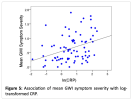Gulf War Illness and Inflammation: Association of symptom severity with C-reactive protein
Lisa M. James, Brian E. Engdahl, Rachel A. Johnson, Apostolos P. Georgopoulos
[Line breaks added]
Abstract
Gulf War Illness (GWI) is a chronic multi-system condition that has affected one-third of U.S. veterans who served in the Persian Gulf. Although GWI etiology remains unclear, mounting evidence points to immune system involvement and inflammation, in particular, as underlying the host of symptoms associated with the condition.
Here we investigated the association between GWI symptoms and C-reactive protein (CRP), a marker of inflammation, in 76 veterans with GWI. Results indicated a highly significant positive association between CRP and mean GWI symptom severity. At the symptom domain level, CRP was significantly and positively associated with Pain, Neurocognitive/Mood, Fatigue, and Respiratory symptom severity but not with Skin or Gastrointestinal symptom severity.
These results support the premise that GWI symptoms, particularly those implicating brain involvement, are a result of neuroinflammation. The cause for inflammation is not known.
We have hypothesized that at the root of GWI are harmful persistent antigens stemming from environmental exposures associated with service during the Gulf War that could not be successfully eliminated due to lack of specific immunity1,2. Work is underway in our laboratory to identify and eliminate persistent antigens in veterans with GWI which we anticipate will result in reduced inflammation and reduced GWI symptoms.
Web | PDF | Journal of Neurology and Neuromedicine | Open Access
Lisa M. James, Brian E. Engdahl, Rachel A. Johnson, Apostolos P. Georgopoulos
[Line breaks added]
Abstract
Gulf War Illness (GWI) is a chronic multi-system condition that has affected one-third of U.S. veterans who served in the Persian Gulf. Although GWI etiology remains unclear, mounting evidence points to immune system involvement and inflammation, in particular, as underlying the host of symptoms associated with the condition.
Here we investigated the association between GWI symptoms and C-reactive protein (CRP), a marker of inflammation, in 76 veterans with GWI. Results indicated a highly significant positive association between CRP and mean GWI symptom severity. At the symptom domain level, CRP was significantly and positively associated with Pain, Neurocognitive/Mood, Fatigue, and Respiratory symptom severity but not with Skin or Gastrointestinal symptom severity.
These results support the premise that GWI symptoms, particularly those implicating brain involvement, are a result of neuroinflammation. The cause for inflammation is not known.
We have hypothesized that at the root of GWI are harmful persistent antigens stemming from environmental exposures associated with service during the Gulf War that could not be successfully eliminated due to lack of specific immunity1,2. Work is underway in our laboratory to identify and eliminate persistent antigens in veterans with GWI which we anticipate will result in reduced inflammation and reduced GWI symptoms.
Web | PDF | Journal of Neurology and Neuromedicine | Open Access

